| Construction Rating: | starstarstarstarstar_border |
| Flight Rating: | starstarstarstarstar |
| Overall Rating: | starstarstarstarstar_border |
| Manufacturer: | LOC/Precision  |
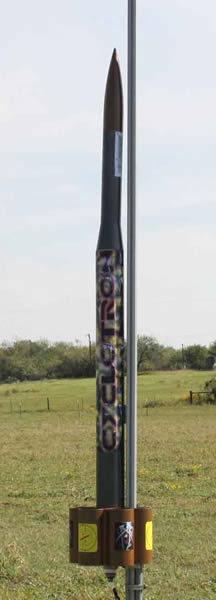
Brief:
Tube Finned, 38mm Motor Mount, Parachute recovery
The LOC Cyclotron looked to be a fairly simple HPR build suitable for somebody with not too much HPR experience. It was a kit I had around for a while but did not get around to building because of few opportunities to launch anything in the HPR range.With some prospects for flight opening up, I dug out this kit and got to work.
Construction:
The first thing that struck me as unusual about this kit was that the directions did not direct me to start with the
motor mount. Instead, the tube fins came first.
Six tubes were provided already cut to length. The tubes were divided into three pairs and then an Estes angle was used to put a straight line along the lengths of three of them.
The tube pairs were then compared for length to make sure that they were all identical. One tube was a bit longer than the others but a belt sander quickly solved that problem. Some 15 minute epoxy was mixed and a brush was used to paint it along the lines scribed onto the three tubes so marked.
The tubes were then pushed together in pairs, checked for alignment and set on a concrete floor to stiffen up. About half an hour later, the tube fins were stiff enough to continue work.
Strips of masking tape were placed at either end of the tube pairs to serve as dams. Some 20 minute finish cure epoxy was then mixed and poured into the creases between tubes. They were set aside to harden and a day later the pairs were turned over and the opposite creases were treated to some epoxy filler.
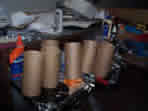
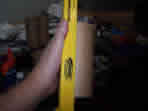
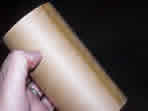
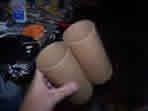
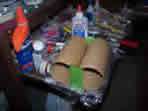
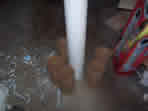
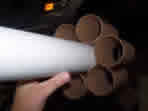
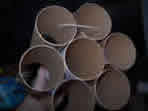
Construction of the motor mount was a simple affair. It consisted of a 38mm motor tube and a pair of centering rings. The interiors of the rings needed a bit of sanding to fit over the motor tube, but that was easily accomplished. A line was marked 1/4" from either end of the tube and the the rings were epoxied into place. When the epoxy had stiffened, a substantial epoxy fillet was laid down on the forward end of both rings. When that had stiffened, a fillet was also placed on the rear side of the forward ring but the rear of the aft ring was left unfilleted for now.
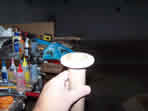
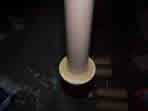
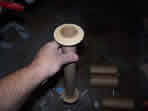
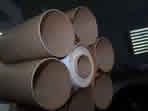
A member on TRF warned me that the tube fins for this rocket were made from coupler tubes instead of the body tube and, as a result, do not close perfectly when arranged around the BT. I found that this was indeed the case. He solved this problem by slipping some plywood spacers between the tubes. I considered doing this. However, while I think that is the best way to go, I did not do so. I had no plywood of the appropriate dimension sitting around and I was impatient to proceed.
I decided to leave a small gap between each pair of 2 tube fins. Accordingly, I mixed some 5 minute epoxy and brushed it on to one of the tube pairs. The pair was then applied to the BT while the BT was sitting on a concrete floor, to keep things straight. When this initial pair had set up, I brushed some epoxy onto each of the remaining 2 pair and the applied them, judging the spacing with nothing except my eyeballs.
The plastic nose cone had quite a bit of flash on it as well as some ugly valleys at the mold lines. I used a razor the scrape away the flash and then sandpaper to smooth it down. I was still not satisfied so I applied some Squadron green putty to the valleys and set it aside to dry.
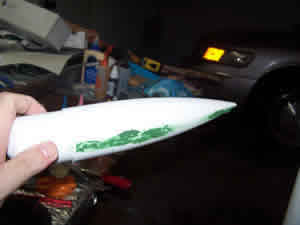
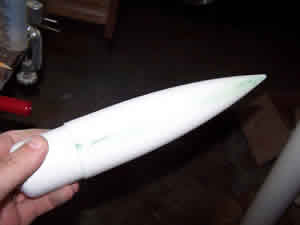
The plastic transition, on the other hand, had no problems with either flash or mold lines. It was ready to go so
I put some epoxy on the small end and slipped the payload tube over it. I then had to use a rag and some alcohol to
clean up the excess.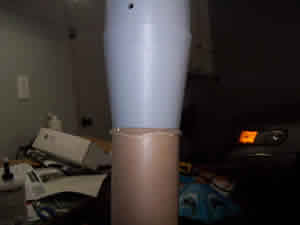
By this point, the epoxy on the motor mount had hardened. I checked and found that the outer diameter of the centering rings fit the body tube just fine and that no sanding was needed. I mixed some more epoxy and applied a generous ring around the circumference about 8" up from the aft end; that was as far as I could reach.
The motor mount was then pushed in until the forward ring was about 2 inches in and another ring was applied just forward of the aft end. The motor mount was then pushed the rest of the way in and the rocket was stood on its tail to let the excess epoxy drift down and form fillets.
A couple of days later I got back to the the nose cone. The excess putty was sanded away and that removed most of the obviously visible problems.
The instructions say that the nose cone can be either epoxied into the payload bay or friction fitted with tape. I almost epoxied it since I never do the payload thing but decided that I might change my mind later. Accordingly I put some tape on the insert of the NC and gave it a tight fit to the payload bay.
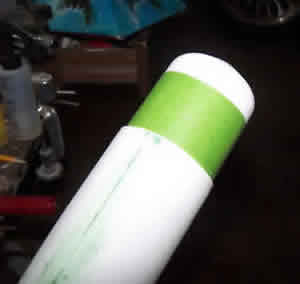
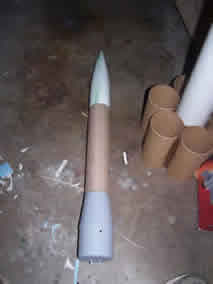
The gaps between tube fin pairs was handled by slipping some cellophane tape into the gap and then pulling it up against the joint in the tube fins from the back side. The ends of the tape were folded up to blockade the ends of the tube. This gave a bottom to the trough that needed to be epoxied. Epoxy was then poured into the trough and allowed to set up after which the tape was removed.
The LOC shock cord mount is an effective piece of low tech. A piece of nylon cord is provided. A loop was tied into the middle of the cord and then overhand knots were tied at either end. A piece of masking tape was then used to place the outside ends of the cord against the inside wall of the BT. Four minute epoxy was then slathered over the tape and string and allowed to set. This method has worked very well for me with some smaller LOC rockets. The question arose in my mind, though, as to how effective it would be with a larger and heavier rocket. People on TRF chimed in and offered the testimony that it worked just fine on even heavier ones. This was gratifying to hear, but I added another layer of epoxy and broadened it out to cover a larger area, just to make sure.
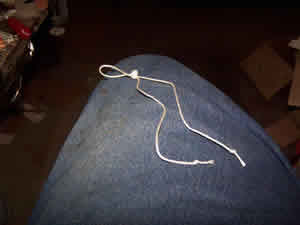
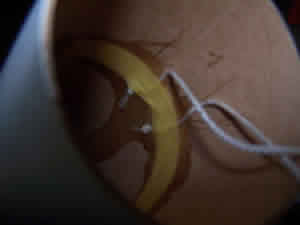
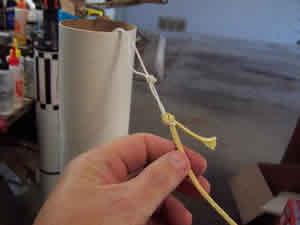
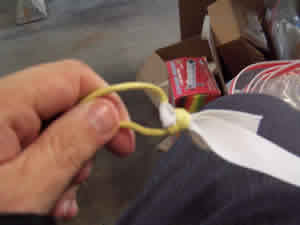
As designed, the nylon cord is attached directly to a long piece of sewing elastic. I decided to make
an addition here and tied in a 6 foot length of heavy Kevlar®
to the nylon using a double sheet bend. The other end of the Kevlar®
was bent to the elastic. I did this for two reasons. First, I like the looks of a longer recover train and second, I
plan on using a Kevlar®
blanket for wadding; the addition of the Kevlar®
cord will keep the elastic from being in the direct path of ejection gasses.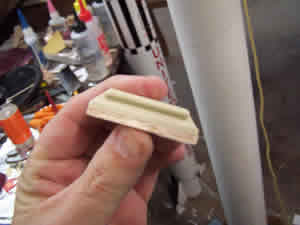
Another modification I made was with the launch lug. The kit came with a 1/2" tubular lug. I wanted to used a linear lug for a rail instead but was stymied by the tube fins until realizing that the rail would fit through the tubes. The next issues was of a standoff to account for the thickness of the tube fins but examining the lug showed that its base was thicker than the tube walls. I decided to fashion a standoff anyway because all I had were #6x3/4" screws and those would have penetrated the body tube far enough to create a snagging hazard. 5/8" would have been perfect.
I traced the lug on a piece of balsa I had handy and cut out the standoff with a razor knife. The resulting standoff was too thick so I took it to the belt sander and slimmed it down. When examining it afterward, I found that the screws would just barely protrude through the BT and I considered it just right. A line was run up from the center of one of the tubes fins and the standoff was epoxied into place.
The actual installation of the lug will wait until after the painting. I considered a tip from TRF to fiberglass the insides of the tube fins but, because of an impending launch opportunity, decided to wait and see how it fares without the additional strengthening. Because of that, the Cyclotron was ready to begin the finishing process.
Finishing:
The first step in the finishing was to take the rocket to the booth and prime it with Kilz. It went on rather thick.
I decided that at the range most people would be seeing this one, filling spirals was not worth the effort.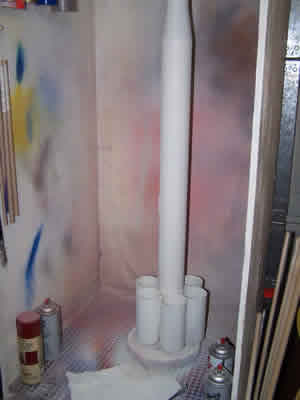
The Kilz had a couple of days to dry and then was sanded to remove the rough buildup of material that had accumulated in some places. The rocket was then taken to the booth and given 2 coats of a metallic charcoal gray. My intent was to get all of the body but I left the tubes and the nose cone alone.
The gray had a few days to dry and then I masked off the top and the bottom with Frog tape and aluminum foil. The rocket then went back to the booth for a darkish metallic gold, almost bronze. After a few hours, I turned it around and painted the back end as well. A few days later I removed the masking and it didn't look too bad.
After the painting, I remembered that I still had to install the lug. The lug was placed and the screws were driven through the balsa standoff. They were then removed and some epoxy was squirted into the holes and smeared along the back of the lug. It was then placed and the screws driven home.
As with every other LOC kit I have seen, this one does not include decals. Instead, their web site provides PDF files to download and print out your own. This strikes me as reasonable since some would rather use their own finishing scheme. The problem I had was a lack of white decal paper on hand and printing on the clear usually leads to the underlying color shifting the printed color. I contacted Gordon of Roachwerks/Excelsior to see if he would print them for me since he always does a fine job. He took a look and then pointed out how expensive they would be and suggested I print on label paper. I normally slam kits that come with stickers instead of waterslide decals but the price was enough to make me reconsider. I printed out all 8 pages on a color laser printer on label paper. As with most LOC patterns, I had more decal than I needed or could use.
The main element of the decorating scheme was the large words "Cyclotron" on a variegated background and meant to wrap all the way around the body tube. Needless to say, this one image took three full sheets. I started at the top and was quickly reminded of why I prefer waterslides; they are more forgiving of initial placement. Eventually all three sheets were cut out and placed but I had to make an extra cut out for the lug.
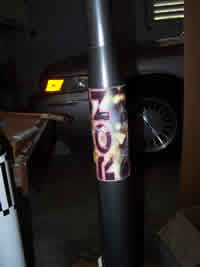
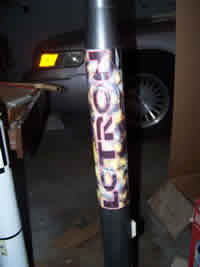
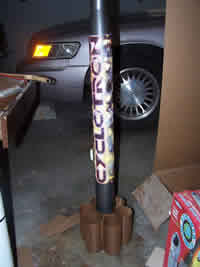
The sheets I printed included 4 schematic representations of what I assume to be a cyclotron printed with red on yellow. It also included 4 stylized atoms depicting the electron orbitals. I decided to use 3 of each and alternate them around the tube fins.
The only 2 other elements of the printed sheets I decided to use were the LOC/Precision logo and a smaller version of the Cyclotron logo used as the main body wrap. I cut them out and applied them on 2 sides of the payload bay.
For some reason, my laser printer did not do a great job of melting all the toner on the decals and I found some of it rubbing off. To mitigate this problem, I sprayed the entire rocket with some gloss coating to fix the toner in place. With that, the rocket was ready to fly.

Construction Rating: 4 out of 5
Flight:
One of the nice features of this kit was that it came with a 38mm to 29mm motor adapter. Had I known this, I would
have started on it sooner. As it happened, I was glad to have the adapter since my source for 38mm motors did not show
up for the maiden launch.
I fitted an Aerotech G77-4R motor into the adapter using tape to bind the thrust ring on the motor to the thrust ring on the adapter. I then inserted the assembly into the motor tube of the Cyclotron and again taped the thrust ring to the 38mm motor tube. The rocket was hooked up on the rail and I found that the rail did indeed fit just fine through the tube fin.
When the launch button was pushed, the motor took a little while to come up to pressure and then emitted a roar that prompted a cub scout present to request that I "not do that again". The rocket rose off the launch rail and took to the air. The flight was straight and the rocket exhibited no weather cocking into the wind we had. The chute ejected at apogee and opened properly. The rocket began to drift down. The rocket came to rest at the opposite end of our field and there was no damage. Unfortunately, I had exhausted my supply of 4 second delay motors.
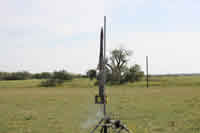
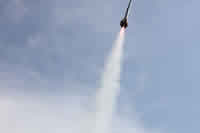
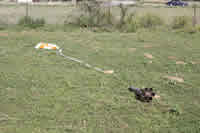
Recovery:
The Cyclotron came with a nice nylon parachute but I did not use it. I had ordered a custom 12 gore 36" chute
from K&S for a Mercury Redstone but found to my dismay that it did not fit. The LOC chute did fit the Redstone and
the custom chute fit the Cyclotron so I switched them. The custom chute worked beautifully.
Flight Rating: 5 out of 5
Summary:
The Cyclotron turned out to be an easy rocket to build and a good flier. It would provide a good L1 project and would
be a nice addition to any fleet.
Overall Rating: 4 out of 5
Other:
It should be noted that the kit I built was apparently a fairly old one that had been sitting in the stock of my
local hobby shop for a long time. A member of TRF reports that since 2007, the tube fins are made from the same stock
as the main body tube instead of coupler stock. This should result in a better build. Persons wishing to follow this
rocket are invited to check here:
http://www.flickr.com/photos/23694991@N03/collections/72157622686424094/
Other Reviews
- LOC/Precision Cyclotron By Mike Walsh, Jr.
(by Mike Walsh, JR. - 04/01/02) Brief: Tube Rocket, with transition Construction: I received the package, and the kit was well packaged. It included 2 main body tubes, a 3.1”x 34” long tube, and a 2.14” x 12” body tube, as well as nose cone, transition, motor mount parts. It also comes with (6) 3.1” Tube couplers, which are used for the fins. They are ...
- LOC/Precision Cyclotron By Joe Balsamo
( Contributed - by Joe Balsamo - 01/01/02) Brief: Single stage, tube-finned, 38mm rocket with a 3" BT transitioning to a 2.14" payload bay. The rocket is very suitable for Level 1 certifications. Construction: 3" LOC main body tube with 6 coupler tubes used for the tube fins. 38mm LOC Motor mount tube is held in place by two centering rings. The kit comes with ...
 |
 |
Flights
 |
 |
Sponsored Ads
 |
 |












J.b.b.j. (March 29, 2007)